Earth Sciences
New automated system provides a way to detect elusive volcanic vibrations
A new automated system of monitoring and classifying persistent vibrations at active volcanoes can eliminate the hours of manual effort needed to document them.
1 hour ago
0
0
Biotechnology
Next generation biosensor reveals gibberellin's critical role in legume nitrogen-fixation
Researchers at the University of Cambridge have demonstrated that the plant hormone gibberellin (GA) is essential for the formation and maturation of nitrogen-fixing root nodules in legumes and can also increase nodule size. ...
59 minutes ago
0
0

Digital food ordering drives increased indulgence and spending, study reveals
As restaurants increasingly embrace technology for placing food orders, a new University of South Florida study reveals that digital ordering platforms significantly influence consumer ...
As restaurants increasingly embrace technology for placing food orders, a new University of South Florida study reveals that digital ordering platforms ...
Social Sciences
12 minutes ago
0
0

Yellowknife study warns of unprecedented arsenic release from wildfires
The wildfire season of 2023 was the most destructive ever recorded in Canada and a new study suggests the impact was unprecedented. It found that four of the year's wildfires in mine-impacted ...
The wildfire season of 2023 was the most destructive ever recorded in Canada and a new study suggests the impact was unprecedented. It found that four ...
Earth Sciences
1 hour ago
0
8

New extremely r-process-enhanced star detected
Using the Gran Telescopio Canarias (GTC), astronomers from the Chinese Academy of Sciences (CAS) and elsewhere have discovered a new extremely r-process-enhanced star in the Milky ...
Using the Gran Telescopio Canarias (GTC), astronomers from the Chinese Academy of Sciences (CAS) and elsewhere have discovered a new extremely r-process-enhanced ...
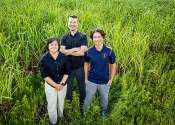
Study identifies best bioenergy crops for sustainable aviation fuels by US region, policy goals
Researchers analyzed the financial and environmental costs and benefits of four biofuels crops used to produce sustainable aviation fuels in the U.S. They found that each feedstock—corn stover, energy sorghum, miscanthus ...
Biotechnology
2 hours ago
0
44
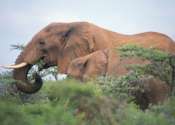
One elephant can sustain more than 2 million dung beetles in east African savannas, study finds
How many dung beetles are there in East Africa? That question inspired a research project more than 20 years ago when Frank Krell was a research entomologist with the Natural History Museum London. Throughout a three-year-long ...
Plants & Animals
2 hours ago
0
11
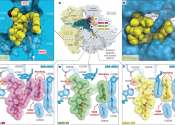
Dual action antibiotic could make bacterial resistance nearly impossible
A new antibiotic that works by disrupting two different cellular targets would make it 100 million times more difficult for bacteria to evolve resistance, according to new research from the University of Illinois Chicago.
Biochemistry
5 hours ago
0
59

Front-line drug for ulcerative colitis found to have additional mechanism of action that until now remained elusive
Monoclonal antibodies have become indispensable in medicine to combat cancers, infectious diseases and autoimmune disorders. But the mechanism of action of a major monoclonal antibody developed for ulcerative colitis has ...
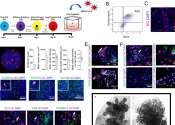
'Mini lungs' research leads to multiple COVID-19 discoveries
Scientists at Sanford Burnham Prebys, University of California San Diego and their international collaborators have reported that more types of lung cells can be infected by SARS-CoV-2 than previously thought, including those ...
Diseases, Conditions, Syndromes
38 minutes ago
0
0

Psychologists use 'Game of Thrones' to advance understanding of face blindness
People who struggle with facial recognition can find forming relationships a challenge, leading to mental health issues and social anxiety. A new study provides insights into prosopagnosia or face blindness, a condition that ...
Psychology & Psychiatry
1 hour ago
0
0
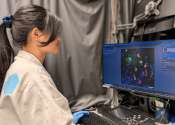
Alzheimer's disease: Study suggests targeting oligodendrocytes could help reduce amyloid beta production
Oligodendrocytes are an important source of amyloid beta (Aβ) and play a key role in promoting neuronal dysfunction in Alzheimer's disease (AD), according to a study published July 23, 2024 in the open-access journal PLOS ...
Alzheimer's disease & dementia
2 hours ago
0
0
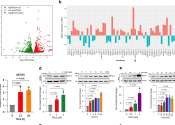
Tumor suppressor protein Par-4 found to trigger unique cell death pathway in cancer cells
A team of researchers at NYU Abu Dhabi, led by Professor Sehamuddin Galadari, has discovered that the tumor suppressor protein Prostate apoptosis response-4 (Par-4) can cause a unique type of cell death called ferroptosis ...
Oncology & Cancer
3 hours ago
0
54

The Future is Interdisciplinary
Find out how ACS can accelerate your research to keep up with the discoveries that are pushing us into science’s next frontier
 Medical Xpress
Medical Xpress

'Mini lungs' research leads to multiple COVID-19 discoveries

Cytotoxic properties of cyclophosphamide: A focus on its mechanistic impacts on male gonadal functions

Psychologists use 'Game of Thrones' to advance understanding of face blindness

Alzheimer's disease: Study suggests targeting oligodendrocytes could help reduce amyloid beta production

New video test for Parkinson's uses AI to track how the disease is progressing

Defying global trends: Study finds high happiness, low depression among oldest Americans

Link between type 2 diabetes mellitus and spinal degenerative disorder may be method-dependent

Physical activity found to cut depression in people with arthritis-related pain

New study links brain microstructure to gender differences in mental health
 Tech Xplore
Tech Xplore

AI study reveals dramatic reasoning breakdown in large language models

Large language models don't behave like people, even though we may expect them to

Wearable sensors help athletes achieve greater performance

Don't look down: fearless trainees propel wind turbine boom

New video test for Parkinson's uses AI to track how the disease is progressing
A video-processing technique developed at the University of Florida that uses artificial intelligence will help neurologists better track the progression of Parkinson's disease in patients, ultimately enhancing their care ...
Parkinson's & Movement disorders
3 hours ago
0
9
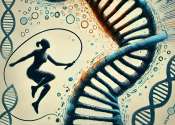
Epigenetics study finds 'jumping genes' support immune cells in tissue
Researchers at the Leibniz Institute for Immunotherapy (LIT) describe a new type of regulation of immune cells by so-called "jumping genes."
Genetics
4 hours ago
0
19

Physicists uncover key to resolving long-standing inertial confinement fusion hohlraum drive deficit
A team of researchers at Lawrence Livermore National Laboratory (LLNL) has made advancements in understanding and resolving the long-standing "drive-deficit" problem in indirect-drive inertial confinement fusion (ICF) experiments. ...
Plasma Physics
4 hours ago
0
89

New 3D reconstruction method aids analysis of property-defining defects
An international research collaboration, including a group from Cornell Engineering, has applied a new X-ray-based reconstruction technique to observe, for the first time, topological defects in a nanoscale self-assembly-based ...
Nanomaterials
4 hours ago
0
20

Lightweight neural network enables realistic rendering of woven fabrics in real-time
Recent advances in the field of artificial intelligence (AI) and computing have enabled the development of new tools for creating highly realistic media, virtual reality (VR) environments and video games. Many of these tools ...

Expiring medications could pose challenge on long space missions
Medications used by astronauts on the International Space Station might not be good enough for a three-year journey to Mars. A new study led by Duke Health shows that over half of the medicines stocked in space—staples ...
Space Exploration
11 hours ago
0
30
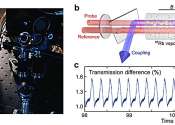
The experimental observation of a dissipative time crystal in a Rydberg gas
A dissipative time crystal is a phase of matter characterized by periodic oscillations over time, while a system is dissipating energy. In contrast with conventional time crystals, which can also occur in closed systems with ...

Spontaneous supercrystal discovered in switching metal-insulator
A supercrystal formation previously unobserved in a metal-insulating material was discovered by a Cornell-led research team, potentially unlocking new ways to engineer materials and devices with tunable electronic properties.
Condensed Matter
4 hours ago
0
33

Study of urban moss raises concerns about lead levels in older Portland neighborhoods
Lead levels in moss are as much as 600 times higher in older Portland, Oregon, neighborhoods where lead-sheathed telecommunications cables were once used compared to lead levels in nearby rural areas, a new study of urban ...
Earth Sciences
11 hours ago
0
23

Hunter-gatherers kept an 'orderly home' in the earliest known British dwelling, archaeological evidence shows
Archaeological evidence from the world-famous Mesolithic site of Star Carr in North Yorkshire has shown that hunter-gatherers likely kept an orderly home by creating "zones" for particular domestic activities.
Archaeology
4 hours ago
0
108

Consortium offers perspectives on large cellular models and the future of AI-driven biological research
In a move to advance the frontiers of artificial intelligence, the Quantitative Biology journal has published a commentary titled "Current Opinions on Large Cellular Models," highlighting the cutting-edge developments in ...

'Floating duck syndrome' can trick people into working hard while failing to achieve their goals
When people present themselves as being effortlessly high-achieving or "perfect," this phenomenon can deceive onlookers into believing success is more easily achieved than it actually is—and lead them to underinvest effort ...

HR departments 'not trusted' to deal with bullying, finds study
Employees have little trust in Human Resources departments to deal fairly and effectively with workplace bullying, according to a new study published in the Journal of Business Ethics.

Opening a window on environmental phenomena with new imaging technology
Data collected by satellites, drones, radars and microscopes provide a goldmine of information to better understand our environment. And when these data are coupled with artificial intelligence (AI), they can unlock the secrets ...

NASA's massive moon booster arrives at Kennedy Space Center
It's still covered up in what looks like the world's largest PEZ dispenser, but the core stage booster for NASA's Space Launch System rocket for the Artemis II moon mission arrived by barge to Florida on Tuesday.

Q&A: Harris 2024? Here's what election and campaign finance laws say
President Joe Biden announced he is dropping out of the 2024 presidential race, leaving Vice President Kamala Harris the top contender for the Democratic nomination. Biden's decision not to seek re-election comes after the ...

Colombia orchid sanctuary collects and clones endangered species
Deep in Colombia's northwestern forests, an orchid enthusiast has gathered a colorful collection of nearly 25,000 specimens, some of which he is cloning to protect them from extinction.

Now entering their adult phase, spotted lanternflies are headed into their invasive peak
As you head out on summer adventures this month, make sure that an unwanted guest isn't traveling with you.

July 21 hottest day ever recorded globally: EU climate monitor
July 21 was the hottest day ever registered globally, according to preliminary data published Tuesday by the EU's climate monitor.

Study links nanoparticles to oxidative stress and neuron death
Researchers at the University of Kentucky have a better understanding of the regulation of extracellular vesicles by oxidative stress and how these vesicles spread oxidative stress and may damage neurons. Extracellular vesicles ...

Lunar exploration ground sites will enhance the Near Space Network's communications services
NASA's LEGS can do more than help Earthlings move about the planet. Three Lunar Exploration Ground Sites, or LEGS, will enhance the Near Space Network's communications services and support of NASA's Artemis campaign.

Woodchip bioreactor helps reduce pesticide run-off from horticulture greenhouses
Pesticides seeping out of intensive horticulture into waterways have long-concerned NSW north coast communities. Now a new Southern Cross University study provides evidence that bioreactors can significantly limit this toxic ...

380-million-year-old rocks provide insights into past climate and geothermal energy
Rocks undergo changes over millions of years. Yet it is possible to extract information from them about the climate at the time of their formation.

Machine learning method uses nonlinear optics and structured light to expand information network accuracy and capacity
Structured light can significantly enhance information capacity, due to its coupling of spatial dimensions and multiple degrees of freedom. In recent years, the combination of structured light patterns with image processing ...

Experts call for better training and support to tackle night-time sexual harassment
A study led by researchers from Northumbria University suggests not enough is being done to ensure women's safety in the night-time economy.

Would you pay to quit TikTok and Instagram? You'd be surprised how many would
Social media is a problem for economists. They don't know how to value it.

New nature writing genre brings wild and tricky aspects of climate crisis to life
We live in an age of climate emergency and eco-anxiety. This is, after all, the Anthropocene—a geological period defined by the bootprint of humans on Earth. Bearing witness to our place in the world is critical now more ...

Examining progress on volatile organic compound pollution control via the catalytic method
Volatile organic compounds (VOCs), with toxicity and irritability, could cause atmospheric environmental problems such as haze and photochemical smog, seriously threatening the ecological environment and human health. The ...

Q&A: Can policy decisions reduce our appetite for meat?
The City of West Hollywood has reportedly adopted an ordinance that requires plant-based food to be served at all city events, with meat available only upon request. The city's goal is to reduce the impact that meat and dairy ...

Seafloor sediment reveals previously unknown volcanic eruption 520,000 years ago in south Aegean Sea
"Core on deck!" For two months, whenever I heard that cry, I would run up to the deck of the JOIDES Resolution to watch the crew pull up a 30-foot (10-meter) cylindrical tube filled with layered, multicolored rock and sediment ...




































































